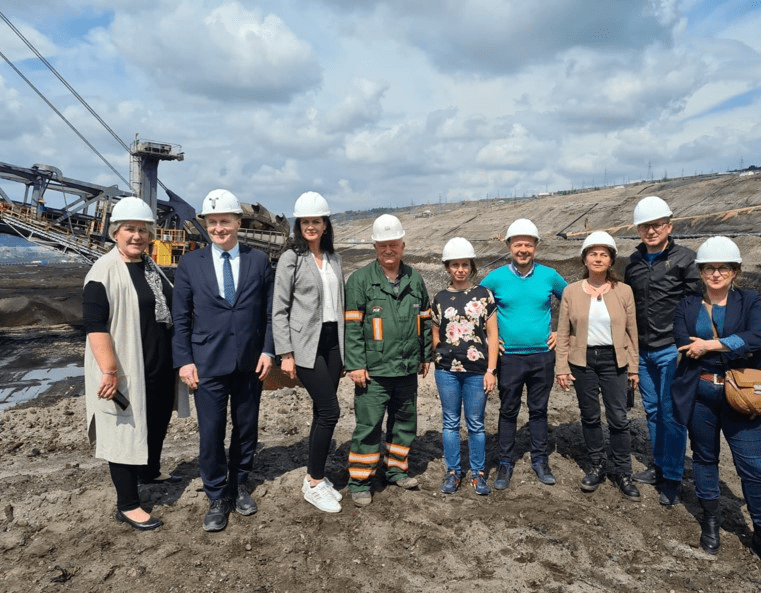Bełchatów is Europe’s largest lignite power plant. Lignite coal is a highly polluting and inefficient type of coal. This plant, located in central Poland, has an installed capacity of 5 GW. It has been the leading employer in the region for many years. In 2022, the Belchatów lignite complex employed some 7,800 people across the two lignite mining fields and the power plant. This is more than 13 percent of the population in the nearby town of Belchatów.
When Forum Energii started their work in Bełchatów, there was no end date for the power plant and mine. To the contrary, the region was planning new open pits to maintain generation. One of the main barriers in the national discussion about moving away from coal had been relations with three neighboring countries with lignite deposits: Poland, Czechia, and Germany. National discussions about decarbonization had stalled, as nobody wanted to be the first mover.
In 2020, Forum Energii and Agora Energiewende, with Crux Alliance support, started to work on this topic, serving as a link between Bełchatów, the Łodzkie region, the national government, and Brussels. Forum and Agora published a report showing that a faster phaseout of lignite in the three lignite-dependent countries would be economically justified and safe for electricity systems, while reducing CO2 emissions by as much as half in all three countries. This report, “Modernising the European Lignite Triangle,” was the starting point of discussion about lignite, and particularly Bełchatów. Forum experts presented the report to key public administration, utility, and European Parliament stakeholders. Four months later, the state utility PGE announced that it would divest its coal assets. Discussion about the end of coal in Poland had started.

In 2021, Bełchatów’s municipal region prepared its just transition plan with Forum Energii’s help. The European Commission was reluctant at first to agree to support the region with EU funds, as the path of closing down blocks was unclear and it was uncertain what other energy sources could be built in the Bełchatów area. Forum lobbied in Brussels and in Bełchatów for a sound plan and a green light from the European Commission. Without the prospect of new projects and a future, the region would not want to consider the end of mining, and local residents’ tension and anger would only grow. In December 2022, the Belchatów region gained access to the just transition plan. It entails direct donations of €350 million for the area directly impacted by negative socioeconomic consequences of power plant and mine closure.
Sound analysis based on modeling was a step toward building understanding of the region, but when it came to drafting the just transition plan, Forum found that engaging with stakeholders and building trust was key. Phasing out coal is easy when you do it in models or Excel files. But in real life, it is about social and economic issues that affect people you meet. Workers, communities, and people impacted by the transition deserve truth and hope for a better future. With Forum Energii’s reports and data-based support, they are addressing both needs.
Just a few short years ago, there was hardly any discussion of the end of lignite mining in the region or interest in the topic either inside or outside Poland. Now, the Bełchatów area has a plan for transitioning away from lignite, with new investments and financial support from the EU. And former vice president of the European Commission Frans Timmermans and Michael Bloomberg have demonstrated personal engagement in Bełchatów’s transition. By 2030, the transition is expected to produce remarkable results:
- An 80 percent reduction of CO2 emissions (compared to 2020);
- A 75 percent reduction in electricity production (from 27.4 TWh to 6.9 TWh); and
- A reduction of lignite coal consumption by 76 percent (from 34.8 to 8.4 million tonnes).
Moving forward, Forum Energii is working with local authorities to get the region to start developing renewable sources more intensively. Forum published a report with Bloomberg NEF, “Bełchatów After Lignite,” outlining possible options for replacing lignite power generation with renewables. They plan to commission another report with a roadmap on how to install and integrate renewable energy. Further, Forum Energii experts are now members of the Monitoring Committee for European Funds in the Łódzkie Voivodeship, a legal and obligatory body overseeing spending EU money, and the Working Group for the Just Transition Fund. Through these venues, Forum Energii will continue working to ensure that the Bełchatów transition realizes its full potential.
